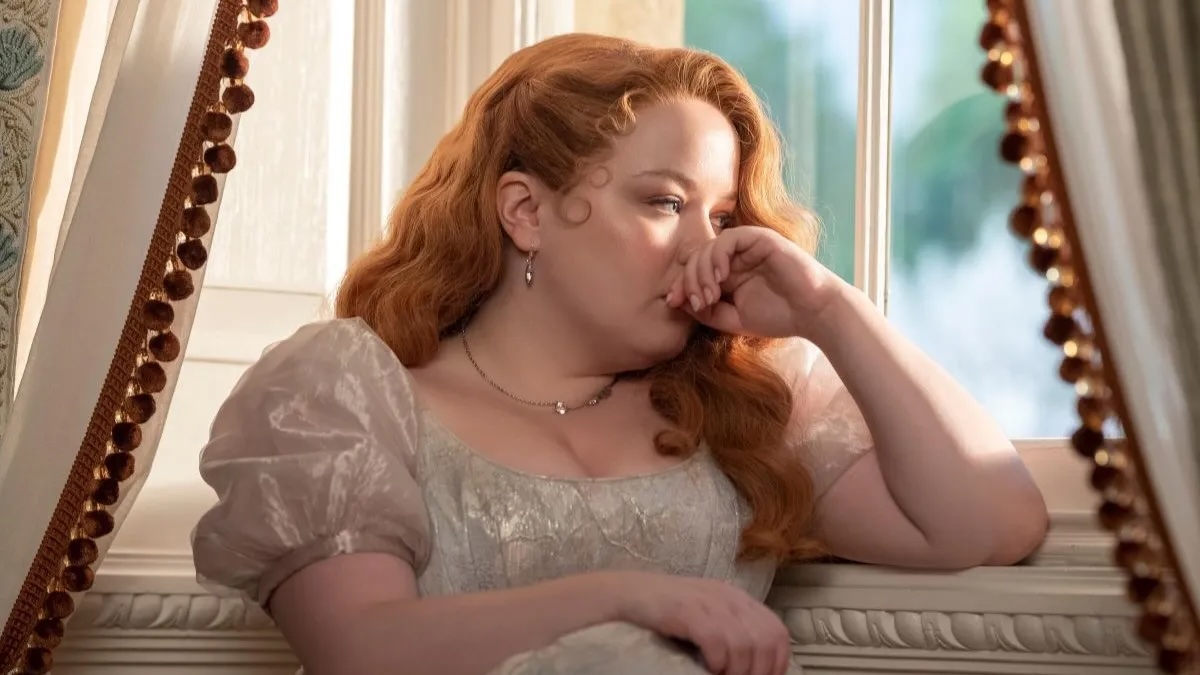I Have Waited My Whole Life for a Character Like Penelope Featherington
When I say that she’s everything to me, I mean it.

The first four episodes of the highly anticipated third season of Bridgerton are finally out, and we can all bask in the burgeoning romance between Penelope Featherington and Colin Bridgerton (Nicola Coughlan and Luke Newton, respectively). I mean, we all knew it was coming—whether you’ve read Julia Quinn’s original novels or not—but seeing it happen is a whole other beast.
And that’s particularly true for plus-size fans, who have been counting down the days to the season 3 premiere—and no, I’m not projecting. I know for a fact I wasn’t the only one desperately waiting to watch this story play out on my screen. As a lifelong fellow fat girl, I was very aware from the moment I picked up Romancing Mister Bridgerton that Penelope’s story was going to spark one of my biggest parasocial relationships to date, and that said parasocial relationship might help heal something that lodged itself in me a long time ago.
Minor spoilers ahead for the first part of Bridgerton season 3.
That’s because it’s so incredibly refreshing to see someone like Penelope get the chance to lead a romance (and a period one, at that). It shouldn’t be, of course, but it is—it’s not something that happens very often, after all, even as representation has moved ever-so-slightly forward in the entertainment industry. The idea of a fat girl being the center of desires both romantic and sexual still feels like the most extravagant science fiction concept to most execs and showrunners—and maybe a good chunk of the target audience for period romance.
It’s not just that Penelope receives romantic attention that ticks off that particular wish-fulfillment box. It’s that she receives romantic attention after having experienced almost nothing of the sort for so much of her life.
Few pieces of media have made me feel as seen as episode 4, “Old Friends.” Specifically, when Penelope explains to Lord Debling that she loves reading stories of romance because at least she gets to experience it by proxy, since she doesn’t really have the possibility to do so in her real life. Or in episode 2, “How Bright the Moon,” when Portia makes it clear, after Penelope was forced to expose her coaching scheme with Colin in Lady Whistledown, that no one has ever really expected Penelope to make a match; that it’s just how things are. Very few media moments have ever rang truer to me personally.
Seeing someone who looks so much like me finally get to live the romance of her dreams after so many years thinking that it simply was not in the cards for her really is the equivalent of a therapy session. I mean, I will still eviscerate the subject with my therapist, but that warm feeling really is something that only Bridgerton has given me in my nearly two decades of fandom.
What really makes me love Penelope, and what has firmly cemented her position on my roster of Most Favorite Characters Ever™, are her faults. Too often the fat character of a story has the same depth as a paper sheet, existing only to be a supporting player in the main story. But Penelope is this season’s lead, so she really can’t be one-dimensional—it also means that she needs a good array of not-so-great character traits. And boy oh boy does she have them.
While Penelope is undoubtedly smart, attentive, witty, and generally kind, she has a meaner side that very much comes out in her Lady Whistledown alter ego. She is petty, taking her “revenge” on the ton by airing all their dirty laundry out on paper using their actual names rather than nicknames. She can also be downright cruel. Eloise is right to be angry with her—though I’m not sure about befriending the one person who has bullied Penelope relentlessly for her whole life—as Colin will be when Penelope’s identity is inevitably revealed in the second half of season 3.
She definitely has amends to make, but even Penelope’s petty side makes me feel seen. While I’ve never personally started a very successful gossip magazine, I have also said and thought things that I regret. And while that’s not an excuse, the fact that I felt like I was so different from my peers when it came to our bodies—growing up in a particularly fatphobic country, might I add—definitely informed that pettiness.
There are several reasons why Penelope is such a beloved character—she has the depth and the range, first and foremost—but for many of us, Bridgerton season 3 is the first time we’ve seen ourselves represented on screen. I can’t definitively say that seeing someone like me in a story like this 15 years ago would have turned my teenage years upside down, but it definitely would have helped.
Have a tip we should know? tips@themarysue.com